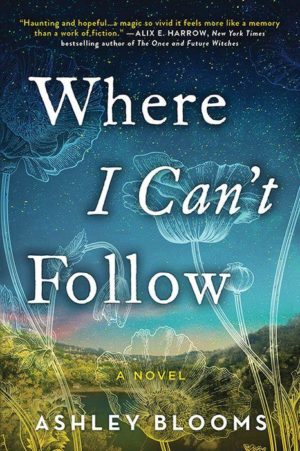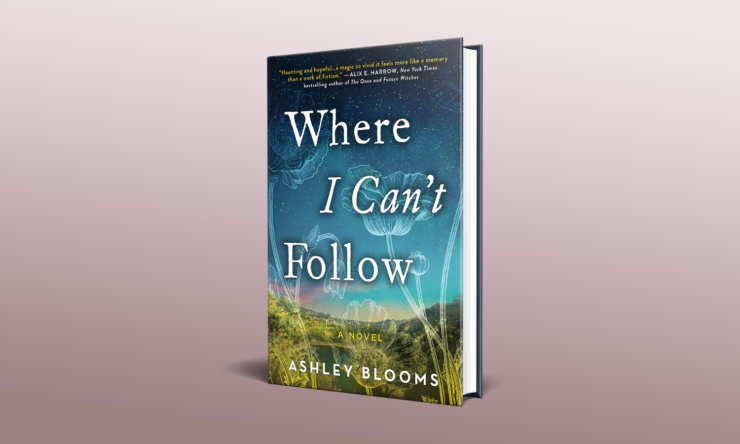Maren Walker told herself she wouldn’t need to sell pills for long, that it was only means to an end…
We’re thrilled to share the opening chapter of Where I Can’t Follow by Ashley Blooms, available from Sourcebooks Landmark on February 15.
Maren Walker told herself she wouldn’t need to sell pills for long, that it was only means to an end. But that end seems to be stretching as far away as the other side of Blackdamp County, Kentucky. There’s always another bill for Granny’s doctor, another problem with the car, another reason she’s getting nowhere.
She dreams of walking through her little door to leave it all behind. The doors have appeared to the people in her mountain town for as long as anyone can remember, though no one knows where they lead. All anyone knows is that if you go, you’ll never come back.
Maren’s mother left through her door when Maren was nine, and her shadow has followed Maren ever since. When she faces the possibility of escaping her struggles for good, Maren must choose just what kind of future she wants to build.
chapter one
When I was little, my cousins and I used to pretend what it would be like when we got our little doors. Even then, we knew not all of us would get a door. Maybe none of us would. Most of our parents hadn’t, and none of our parents had taken their door even if they had gotten one. Not yet, anyway.
No one really knew how the doors worked, only that they showed up from time to time and seemed to appear to people who really needed them. The doors found the hurt, the lonely, the poorest, and the most desperate. They seemed to have the same taste in picking partners that I would develop when I grew up.
No one knew where the doors led. They may have taken everyone to the same place—some pocket of some world where the sky was green and the grass tasted like Peach Nehi. Or maybe they took people through time. Shunted them forward or dragged them back. Maybe they were dream doors, leading us to the place we wanted most. Some people claimed the doors led to Hell, of course, but those people claimed most things were portals to Hell—talking during church service, smoking menthol cigarettes, wearing a thin T-shirt over a dark bra, or worse, not wearing a bra at all.
The doors never looked the same, either, and only the first one ever witnessed had been a little door at all. Everyone in Blackdamp County knew the story. Elizabeth Baker, 1908. A door three inches high appeared on top of the piano she played at church. When she’d asked who had placed it there, no one else could see it, so Elizabeth pretended she’d made a joke. Even then, she knew what happened to women who claimed to see things no one else saw.
She’d gone through her door two weeks later, after she’d asked her father to baptize her for the second time, just in case it would help her wherever she was going.
Since then, the doors had come in all shapes and sizes: a well that appeared in the center of Donna Gail’s kitchen; a hole in Ida Ross’s bedroom wall that slowly grew bigger and more ragged and warmer by the day; a ladder that stretched past Mr. Coleman’s apple trees and into a low fog that never moved and never thinned; a length of rope that led between the trees in Tanya Ross’s backyard and into the darkest darkness she had ever seen. My favorite doors had always been an empty teacup with a chip in its handle; a skeleton with the teeth still stuck inside its jaw, the mouth opened just enough to show something glimmering inside, like light skipping across a pond; and a book lying open with big, looping scrawl across its pages like a child’s handwriting when they were pretending to write a story.
No matter what they looked like, every door after the first was called a little door. Like many things in Blackdamp, that would never change, no matter how little sense it made.
The most important thing I’d ever learned about doors was that they didn’t go away on their own. This seemed the best part of all to me. Something that would never leave you. Something guaranteed to stay. It seemed that doors had to be sent away by their owner—closed, really, once and for all. Though no one was entirely sure how this worked, either. Some people said they’d simply closed their eyes and willed their door away while others composed lengthy goodbyes. One woman claimed she’d danced with her door in the summer—long grass of her backyard and that the door had left her midtwirl because it simply knew she could never walk through it.
Buy the Book


Where I Can’t Follow
And while all these stories were lovely, they were also incredibly frustrating to anyone who wanted simple, solid answers. In that way, doors were a lot like love. No one could really tell you exactly what they were or how they worked, but everyone was sure you would understand if you were ever lucky enough to find one.
But that summer when I was nine, for me and my cousins, our door was an old hollow-core one that Uncle Tim had taken off an unused shed and set in concrete in the field behind Granny’s house. The door’s frame was old and soft with wet rot. It smelled like damp earth, and it gave beneath our fingers when we gripped it too hard. All that only added to its magic. The door was a frail thing, shooting up out of the ground beside the bloodroot and goldenrod like they’d all grown there together. We let the door swing open and took turns running through it, shouting where we thought the door might take us.
Dollywood.
Wisconsin.
The ocean.
I’d shouted the last one and then jumped through, standing triumphant in the tall grass until I realized I didn’t know how to swim.
“I’m drowning,” I’d cried and fallen to the ground in a heap.
The grass swayed above me, and my cousins ran around delirious with heat and imagination. That’s when I’d noticed my mother standing at the top of the hill watching us. Her arms were crossed over her chest, and she had a strange blue flower tucked into her hair. I wonder now if she’d already made up her mind and knew that in two months’ time she would be gone, walking through her own door and into some other world, leaving me behind with no parents, no home, no explanation.
I’d wanted a door more than anything back then, but after Mom left, I’d begun to doubt the doors. They seemed meaner once they’d taken her, little magic thieves who didn’t care about daughters at all. Then I moved in with Granny, and she rarely talked about Mom or the doors. She had this way of ending things like weeding a garden—she’d snatch them up by the roots, pull hard, let go.
But it wasn’t that easy for me. I kept thinking that if the doors could lead anywhere, maybe my door could lead me back to Mom. They had taken her from me, and then they became the only chance I had of getting her back.
So a part of me wondered. Waited.
But of all the ways I’d imagined I might get my door, and all the shapes I thought it might take, I never expected to find it the way I did.
Excerpted from Where I Can’t Follow, copyright © 2022 by Ashley Blooms.










